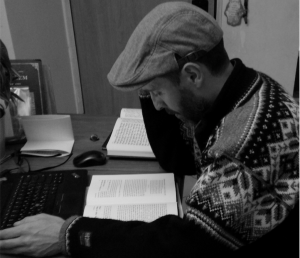Sensing Truth: Looking up and seeing portentous things
The Biblical act of seeing is never univocal, never simple. Rather, seeing is, by and large, a matter of will – perception entails a degree of preparation and of focus. To see is to know – and to know is to see.
This kind of conception of sight is quite distant from what we define today as sight. For the modern reader, who lives in a highly visual dimension where pictures are taken all the time and everywhere, visual perception is often a given, a natural part of everyday life such as breathing, or eating. One defines one’s daily acts by visual portrayals – selfies, pictures of legs on the beach, pictures of delicious courses at a restaurant, smiling happy faces with breathtaking views. In the contemporary world, no ceremony takes place without a video recording; children in daycare are perceived strictly through phones; all events require a video-documentation, and no event is perceived directly any more, but solely through the filter of a black mirror. Apps provide ready-made filters through which we are encouraged to perceive ourselves, as we propose our appearance to an audience with the precise intent of being special, of being viewed – the higher the number of viewers, the clearer it is that we exist. Needless to say, that this heavily visual world we inhabit has necessarily brought to a paradoxical combination of two outcomes: a fetishistic adoration of images and videos on the one hand, and a banalization of those very images on the other. Images are empty as the faces reflected in them.
True, one’s eyes cannot look beyond the immediate present all the time. Most often, we are entrenched in the difficulties of the now, which prevents the eyes from perceiving more – a mind clogged by the here and now is understandably unable to lifting itself up and seeing things from afar.
When Abraham looked up, his eye fell upon a ram, caught in the thicket by its horns. (Gen22:13)
The difficulty of the tests we are presented with in life typically draws our eyes down, into the irreconcilability of the moment – it is by an act of disconcertingly senseless will that the individual looks up, and sees things hidden just a moment ago.
On the third day Abraham looked up and saw the place from afar. (Gen. 22:4)
The pact with Gd provides the framework for this uplifting of the eyes – yet it certainly does not entail a certain refinement of perception. It is the individual who must want to see, and rely on Divine support. It is three days after his circumcision that Abraham perceives three men approaching, three Divine figures:
Looking up, he saw three men standing near him. As soon as he saw them, he ran from the entrance of the tent to greet them and, bowing to the ground, he said, “My lords (אֲדֹנָ֗י) if it please you, do not go on past your servant. (Gen. 18:1-3).
It is necessary to look down in order to look up – and it is necessary to lose one’s sense of self in order to meet the Other with enthusiasm and lovingkindness.
In section 254 of Rebbe Nachman’s Likutei Moharan we read the following:
Eyes are very lofty and exalted entities. They are constantly seeing things that are great and awesome. If a person were worthy of having refined eyes, he would know very great things simply from what his eyes see, because they are constantly seeing. However, he does not know what he sees.
For example, when something is flashed very quickly across a person’s field of vision, he does not know what he saw, although, as it was passing in front of his eyes, he certainly did fully see it. Even so, he does not know what he saw, for although his eyes saw the object in its entirety, nevertheless, because of the speed there was no time to bring the sight to the mind for him to know what he saw. For knowing what one saw depends upon the mind, and this requires a certain amount of time, with the object remaining in his view for a brief period. This allows the power of sight to bring and transfer the object being viewed to the mind, in order that the mind may know what he saw. However, due to the speed, he saw the object only with the sense of sight, but there was no time to transfer the object to the mind. He therefore does not know what he saw.
Similarly, with his eyes a person constantly sees great things {i.e., visions and revelations}. However, it is akin to something being flashed in front of him very quickly. He therefore does not know what he saw, as explained above. Understand this.
The individual sees everything. Seeing is for R. Nachman not an act of will, but a passive perception of things in and of themselves. One sees miracles and revelations, but one does not see them – one only perceives them physically, but the perception does not reach the mind. One must reach the uplifted state of consciousness in which one knows what one sees. Otherwise portents and wonders appear to us as flashes in front of our eyes.
Eyes, R. Nachman states, are lofty and exalted entities – let us lift them from the immediacy of pragmatism and technocratic ignorance, and perceive things through imagination, through the power of the mind to elaborate and understand.
*Yaakov Mascetti (PhD) teaches at Bar Ilan University.

